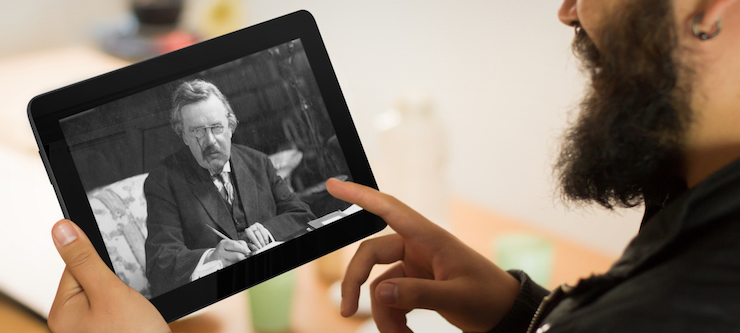[TL;DR: Help collect and digitize all of G.K. Chesterton’s writings. Play a key role in Chesterton’s cause for sainthood. Click here to help!]
A couple years ago I attended the 2016 G.K. Chesterton Conference in Slippery Rock, Pennsylvania. It was such a blast. I joined over 300 fellow Chestertonians to celebrate GKC’s wit and prophetic witness.
(And psssttt…guess what? The 2018 Chesterton Conference will be here in Orlando! I’ll be there and would LOVE to see you, too!)
Anyways, I had lots of fun at the conference, but one conversation stood out. Nancy Carpentier Brown, who has authored several books about Chesterton including a magnificent biography of his wife, Frances, revealed to me an incredible project she’s been quietly helping with, behind the scenes among Chesterton fans.
It’s called the Chesterton Digital Library.
The goal? To digitize all of Chesterton’s prolific writings and put them online so anyone can access them. Many of his works are already available through public domain sites, including his novels and major essay collections, but these are only the tip of his massive literary iceberg. The books account for less than 20% of everything he wrote. In fact, we’re still discovering new essays!
Thus the Chesterton Digital Library was born. The group hopes to collect all of his extant writings and share them online with the world.
To do this, they’ve gathered a small team of intrepid volunteers who visit obscure libraries and archives, tracking down long-forgotten Chesterton essays, stories, poems, and book reviews. Many of these haven’t been seen for decades. They scan or photograph the texts, then pass the images to another small team of transcribers who carefully type out each page.
(On a side note, Nancy invited me to join the transcribing team and I’ve already tapped out a few essays myself. It’s a strange thrill to type out the very same words that Chesterton once dictated or put to paper. It’s as if you’re channeling his own creative spirit!)
The Chesterton Digital Library has already made great progress. So far, the team has formatted text files for 5,771 (87%) of the estimated 6,600 unique works authored by G.K. Chesterton, and they’re on pace to have almost all his works finished soon.
Obviously, the big victory is this will make Chesterton’s works more accessible than ever before. Anyone will soon be able to browse all of his writings online, in a searchable database, free of charge.
But there’s another reason this project is so exciting and important:
It will help Chesterton’s cause for sainthood!
You may have heard that back in 2013, the Diocese of Northampton in England took the first steps toward opening the cause of G.K. Chesterton. But in order for the cause to progress (i.e., in order for the Church to recognize him as a saint), the Vatican requires a thorough review of all his published work…which requires that someone first collect all that work!
For less prolific saints, such as Louis and Zélie Martin, who Pope Francis recently canonized, that task is pretty simple—they didn’t write much. But for a saint like G.K. Chesterton, who published a mind-bending 15 million words in his lifetime, it’s a bit more difficult.
(Do the math: if the average book is 250 pages at 200 words/page, then 15 million words is equivalent to 300 full-length books!)
And that’s why we need your help.
So far the Chesterton Digital Library has operated on a shoestring budget, mostly with volunteers and a few minor donations.
A group of web designers, developers, and database specialists have been donating their valuable time to help create the website and database.
But to bring this project to completion, to actually get it online, we need your help. And frankly, that means we need some money.
Dale Ahlquist, president of the American Chesterton Society, explains:
Click here to donate + help G.K. Chesterton become saint!
Frequently Asked Questions
Why do we need the Chesterton Digital Library (CDL)?
Because our insane world demands an apostle of sanity…and that’s G.K. Chesterton 🙂
More seriously, there are two reasons why this is especially needed NOW.
First, in order for someone’s cause for canonization to progress (i.e., in order for them to be recognized as a saint), the Vatican requires a thorough review of all the saint’s published work. Therefore, collecting, tagging, and digitizing all of Chesterton’s writings will literally be helping G.K. Chesterton’s cause for sainthood!
A second reason is that this will help so many people. Chesterton fans, students, scholars, clergy, families, homeschoolers, and more will all be able to access the writings of this gifted mind. The Chesterton Digital Library will fulfill the aims of the American Chesterton Society by making Chesterton’s extensive writings more accessible to the world, becoming the only existing source of the complete works of G.K. Chesterton.
What has been done so far?
Over the past fifteen years, the American Chesterton Society (ACS) has collected paper and digital copies of thousands of Chesterton’s works from libraries, archives and private collections around the world. Many of these are long-forgotten works that haven’t been seen for nearly a century.
In 2013, the American Chesterton Society appointed a project manager who reviewed existing online single-author libraries and investigated various indexing solutions, user interface options, and intellectual property issues. Using a soon-to-be-published 900-page bibliography of Chesterton as a reference, the project manager developed a spreadsheet which matched the existing paper and digital files in the possession to all of Chesterton’s known works. This established a baseline of what has been collected so far, and what works remain to be collected and transcribed. A three-person Advisory Panel has been formed to oversee the continuation of the project.
What’s the current status of the Chesterton Digital Library?
The American Chesterton Society now has formatted text files for 5,771 (87%) of the estimated 6,600 unique works authored by G. K. Chesterton. We estimate most of the works will be finished by the end of this year.
What is being done now?
A small team of volunteers is searching for the remaining works, collecting them as digital images, primarily by scanning or photographing physical works at various libraries. These images are then sent to a separate team of volunteers, who transcribe them into formatted text files (Microsoft Word, DOC format). The text files will then be used to create the full-text, web accessible material for the public.
What remains to be done?
- Remaining works must be found, scanned or photographed, transcribed, and proofed by ACS volunteers.
- Citation information and additional metadata (genre, subjects, etc.) for the texts should be entered into a publicly accessible database via a web platform interface. ACS volunteers are willing to do this data entry work.
- Providing full-text searching of the documents and field searching via the database.
- The assembled database, with an estimated 24,000 files totaling 25 GB of data at its projected maximum size, must be hosted on a server (this is expensive, and the main reason we’re raising money)
- Copies of the digital text files will be stored for long-term preservation on a server, and updated with newer versions as typos, etc. are found and corrected.
- Longer range effort could make the library even more useful for scholarly research, such as implementation of the following enhancements:
- Works could be categorized by subject matter, using a pre-defined list of subjects in the fields of religion, history, economy, ideology, social concerns,
- Works could be embellished with notes and explanations to make them more understandable outside their original context.
- Images (caricatures, cartoons, drawings, etc.) could be added to the library, as well as articles about Chesterton and foreign translations of his works.
- Links can to be established to/from other literary and research sites such as Wikipedia, Project Gutenberg, and other online libraries.
- After the collection is made available online, it must be maintained and updated as additional works are identified, located, proofed, and digitized. A workflow should be established so that, ideally, ACS volunteers can serve as CDL site administrators to make changes and respond to user feedback.
What issues remain to be addressed?
ACS is aware of and is working to resolve the following issues related to full implementation of the online Chesterton Digital Library.
- Absent the partnering with a major university partner who can provide institutional support with technology, ACS must secure $20,000 funding for web site development.
- ACS believes approximately 47% of Chesterton’s unique works are in the public domain, so the copyright status of the remainder must be assessed, mitigated, and resolved. Full-text access to public domain material, and limited or restricted access to copyrighted material and citation information, must be determined. As restricted materials enter the public domain, those materials may be incrementally added to the publicly available content.



